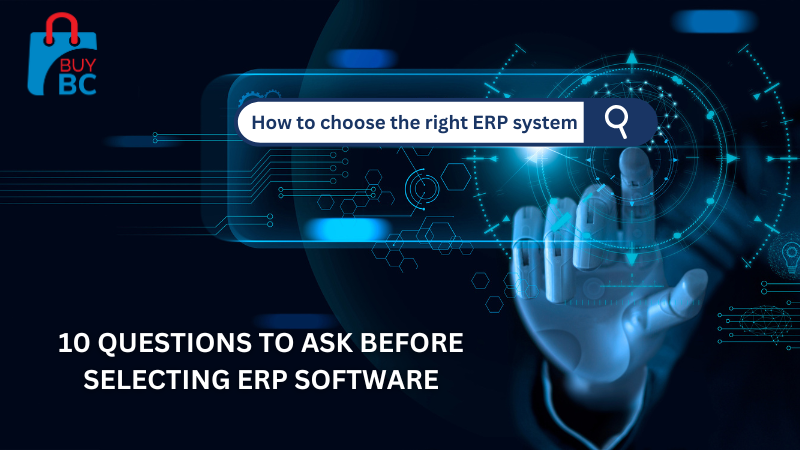
Choosing an Enterprise Resource Planning (ERP) system is one of the most important decisions a business owner can make. It impacts every part of your business, from finance and operations to sales and customer service. Pick the right system and you set your company up for years of smoother processes, faster growth, and higher profitability. Choose the wrong one and you risk budget overruns, operational chaos, and setbacks that could affect your business, a common challenge for companies that skip a careful ERP selection process.
For business owners ready to upgrade their systems, the process can feel overwhelming. With so many options, features, and technical terms to consider, making the right choice is not easy. That is why we have put together ten essential questions to ask before choosing ERP software, which serves as your step-by-step guide on how to choose the right ERP system. Getting clear answers to these questions is key to a smooth ERP implementation and a reliable way to avoid costly mistakes like ERP failure.
Step 1: Define Your Vision – What to Consider When Selecting ERP
Before you even speak to a vendor, the focus must be entirely internal. The right ERP for small business, like Microsoft Dynamics 365 Business Central selection starts with a rigorous analysis of your current state and future goals.
1. What are our Top 3 Pain Points and Success Metrics?
A new ERP is not just software; it’s a solution to core business problems. Identify the critical common ERP selection mistakes you are trying to fix, such as excessive manual data entry, poor inventory accuracy, or slow financial close processes.
Actionable Insight: Define measurable Key Performance Indicators (KPIs) for each pain point. This ensures your ERP selection criteria are outcome-driven and measurable.
2. Is the ERP System Scalable and Flexible Enough for Growth?
Your business will grow and change over time, so your ERP system must be able to scale without major disruptions. Evaluating flexibility and scalability now helps prevent costly upgrades or replacements in the future.
- Can it handle doubling user licenses and transaction volume?
- Can it easily integrate new modules as your business expands?
- Does the licensing model support incremental growth without re-platforming?
3. Will the ERP Integrate Seamlessly with Existing Applications?
A centralized ERP system only delivers value if it works well with your existing tools, such as payroll, CRM, e-commerce platforms, or industry-specific software. Poor integration is one of the most common ERP selection mistakes, so it’s essential to ask the right questions before committing.
Questions to Ask Vendors:
- What native connectors exist for our CRM or e-commerce platforms?
- What integration methods are used (API, third-party connectors) and what are the associated costs?
- How is data governance handled across integrated platforms to ensure accuracy and consistency?
Step 2: Evaluate the Solution – Best ERP Selection Criteria
Once your requirements are clear, you can dive into the technical capabilities and the financial reality of the solution. These questions are crucial for assessing the best ERP selection criteria.
4. What is the True Total Cost of Ownership (TCO)?
Looking only at the initial price can be misleading and lead to unexpected expenses later. Evaluating the full TCO helps you understand the complete financial impact of your ERP investment, including all upfront and ongoing costs.
- Licensing and modules
- Implementation: consulting, data migration, customization
- Ongoing maintenance, updates, system administration
- Training and support
A Cloud-First model shifts costs to predictable operational expenses and reduces maintenance burdens, making budgeting easier and more reliable.
5. Does the ERP Include Built-In Automation and Intelligence?
Modern ERP solutions, like Business Central, go beyond basic transaction management by offering automation and AI-driven insights. These features can save time, reduce errors, and help your team make smarter, faster business decisions.
- Smart forecasting to predict demand
- Automated invoicing to speed up cash cycles
- Predictive maintenance to reduce equipment downtime
Vendor Test:
- Number of successful implementations in your industry
- Customer references for similar-sized companies
- Partner expertise in your industry’s processes
6. What is the User Experience and Training Requirement?
Even the most capable ERP system can fail if employees struggle to use it. Understanding usability and training needs ensures your team adopts the system quickly and efficiently.
- Role-based interface (CFO vs warehouse manager)
- Time to proficiency for average users
- Mobile accessibility for on-the-go operations
Step 3: Ensure Long-Term Success – ERP Vendor Partnership Questions to Ask
ERP is a long-term investment, and a strong partnership with your vendor and implementation team is critical to success. You are not just buying software; you are building a relationship that directly impacts adoption, ongoing support, and ultimately, how to avoid ERP failure.
7. What is the Implementation Methodology and Change Management Plan?
Understanding the vendor’s implementation methodology and change management plan is crucial to ensure your ERP project stays on track. Clear processes and responsibilities help your team know what to expect at each stage and support smooth adoption across the organization.
- Key milestones and required resources
- Timeline and deviation management
- Change management to ensure user adoption
8. What is the Vendor’s Product Roadmap and Stability?
It is essential to know that your ERP vendor will continue to invest in the platform and maintain long-term stability. Understanding the planned features, update frequency, and security strategy helps ensure your ERP remains current, secure, and aligned with your business needs.
- Planned features over next 12–24 months
- Major update frequency and process
- Security and compliance strategy
9. What Support Level and Response Times Are Guaranteed?
Even the best ERP can face issues. Knowing the support structure and guaranteed response times ensures your business can operate smoothly, minimize downtime, and quickly resolve problems when they arise.
- Post-go-live support handled by vendor or partner
- Response times for critical vs non-critical issues
- Availability of self-service resources
10. How Will Data Migration and Cleansing Be Managed?
Migrating data from legacy systems is often the most challenging part of any ERP project. Clarifying responsibilities, tools, and the approval process ensures data accuracy and prevents problems after go-live.
- Who handles data cleansing?
- What tools help import and validate data?
- What is the sign-off process for migrated data?
Conclusion: Make a Strategic ERP Choice for Your Future
Selecting an ERP is not just picking software; it is shaping the backbone of your business operations. By asking these ten questions, you move beyond generic pitches and focus on critical factors such as scalability, TCO, usability, and vendor partnership.
The insights gained from this structured ERP selection process empower you to make a confident choice and understand how to choose the right ERP system that aligns with your growth ambitions.
Contact us at sales@buybusinesscentral.com to start your strategic Business Central ERP journey today.


 NB Projects
NB Projects  NB Procure
NB Procure  NB Assets
NB Assets  NB Quality
NB Quality  NB Payroll
NB Payroll  NB PDC Manager
NB PDC Manager  NB India GST
NB India GST  NB Credits
NB Credits  NB Procure B2B Marketplace Connector
NB Procure B2B Marketplace Connector  NB Scheduler
NB Scheduler 



